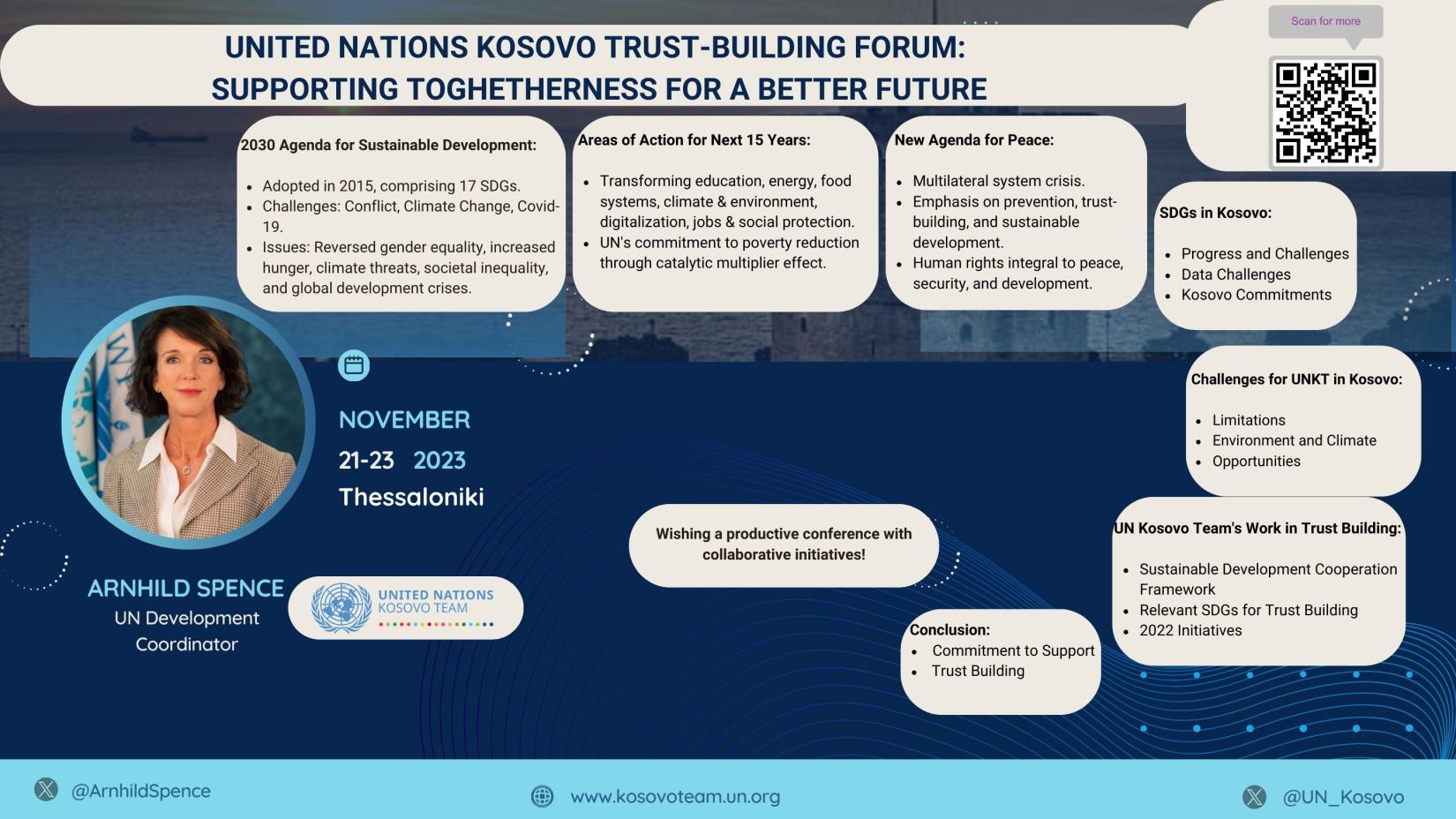UN Development Coordinator Addresses UNMIK Thessaloniki Trust Building Forum
UN Development Coordinator Addresses UNMIK Thessaloniki Trust Building Forum
Main links to the documents related to the speech
- Our Common Agenda Policy Brief 9 New Agenda for Peace Link.
- Our Common Agenda Policy Brief 6 Reforms to the International Financial Architecture Link.
- Political declaration of the high-level political forum on sustainable development convened under the auspices of the General Assembly Link.
- Six Transitions: Investment Pathways to Deliver the SDGs Link.
- The commitment of Kosovo government to acceleration of SDGs and Agenda 2030 Link

UN Development Coordinator Addresses UNMIK Thessaloniki Trust Building Forum
In the realm of global development, the year 2015 marked a significant milestone with the adoption of the 2030 Agenda for Sustainable Development, encompassing 17 Sustainable Development Goals (SDGs). As we find ourselves at the midpoint of this ambitious agenda, it is crucial to acknowledge that numerous SDGs face stagnation or regression. The challenges of Conflict, Climate Change, and Covid-19, the three Cs, are pivotal in explaining these setbacks.
Gender equality has taken a step backward, hunger persists, climate change looms as an existential threat, and societal inequalities have deepened. Alarmingly, half of the world's population lacks social protection, contributing to a global development crisis, particularly evident in education and health sectors.
Over the next 15 years, six key areas of action can act as a catalytic multiplier effect across the SDGs: Transforming education, Energy, Food Systems, Education, Climate & Environment, and Digitalization, Jobs & Social Protection. This holistic approach can uplift communities, effectively combating poverty.
In response to the current multilateral system crisis, the UN Secretary-General's New Agenda for Peace strives to address diminishing human security and social cohesion. This agenda underscores the inseparable link between prevention, trust-building, and sustainable development. The ongoing crisis in the Middle East underscores the urgency of taking Human Rights violations seriously, emphasizing their interconnectedness with peace, security, and development.
Shifting focus to Kosovo, progress has been made in achieving upper-middle-income status, coupled with a decline in poverty. However, significant challenges persist across various SDGs, such as poverty, education, youth unemployment, clean energy, health, gender equality, and climate change.
Data challenges in Kosovo are substantial, with significant gaps in various SDGs. Despite these challenges, there are opportunities for accelerated development, including the upcoming Census 2024 and the alignment of the National Development Plan with the SDGs.
Kosovo has committed to a transformative agenda for SDGs, aiming to reduce its poverty rate and transition to renewable energy while embracing digital transformation and education reforms. However, challenges persist, including limited global incentives, non-signatory status to Agenda 2030, and exclusion from certain international mechanisms.
The UN Kosovo Team actively engages in trust-building initiatives, addressing social cohesion through inter-community dialogue and collaboration with UNMIK. Pertinent SDGs for trust-building in Kosovo include No Poverty, Gender Equality, Decent Work, Reduced Inequalities, and more.
Initiatives championed by the UNKT include community programs, language learning platforms, and efforts to protect cultural heritage. Despite challenges, the commitment to advancing SDGs at the local level is evident, as demonstrated by Vushtrri's Voluntary Local Review.
In conclusion, the UNKT reaffirms its commitment to supporting Kosovo on its path to achieving the SDGs. The intertwining of sustainable development, peace, and human rights is crucial for a prosperous future. The ongoing efforts in Kosovo, despite obstacles, serve as a testament to the resilience and dedication needed for positive change.
Background Section: Key Priority SDGs for Trust Building
Addressing the specific challenges in Kosovo, priority SDGs for trust-building efforts include No Poverty, Gender Equality, Decent Work and Economic Growth, Reduced Inequalities, and peace, justice, and strong institutions (SDG 16).
These priorities necessitate comprehensive reforms, ranging from social protection measures to legal reforms, gender-responsive budgeting, and initiatives promoting inclusive education and decent work. Despite challenges, the UNKT remains at the forefront, emphasizing both immediate relief and long-term sustainable development.
Key SDGs lagging in Kosovo, such as Health (SDG 3), Education (SDG 4), Clean Energy (SDG 7), Sustainable Cities (SDG 11), and Climate Change (SDG 13), require strategic interventions. Efforts to improve health services, education infrastructure, energy efficiency, urban planning, and climate resilience are imperative for Kosovo's sustainable development journey. The commitment to data collection and alignment with global agendas demonstrates Kosovo's dedication to overcoming challenges and fostering positive change.

















